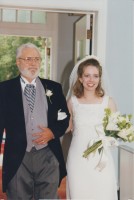 As many of you know, my father was not a man given to linguistic excess: he had sufficient respect for the power of words that he would not use them lightly. For example, if he were eating a particularly delectable serving of prime rib, he would never have declared it “the best prime rib ever,” because he would have readily recognized the possibility that there might be still better prime rib out there somewhere.
As many of you know, my father was not a man given to linguistic excess: he had sufficient respect for the power of words that he would not use them lightly. For example, if he were eating a particularly delectable serving of prime rib, he would never have declared it “the best prime rib ever,” because he would have readily recognized the possibility that there might be still better prime rib out there somewhere.
I have inherited this penchant for linguistic precision, and showed signs of it even at an early age. Apparently, at some point during my younger years, I told my father something to the effect of “Daddy, of all the fathers I know, you’re definitely in the top five.” Far from being insulted, he was both delighted and touched, because he recognized that this was no mere outpouring of well-meaning but childish hyperbole; it was a carefully considered declaration of my affection.
I have also inherited my father’s — and mother’s — love of literature, and my husband claims that I can’t get through a day without quoting some of it (my response to this assertion was “Why would I want to?”). I turn to literature for entertainment, but also for edification and encouragement, which is why I chose to include excerpts from certain poems in today’s program.
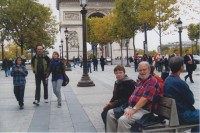 In the first poem, “Death, Be Not Proud,” John Donne is essentially challenging Death, telling Death, “You may think you’re all strong and tough, but you’re really not that impressive — or permanent — after all.” In Anne Bradstreet’s “As Weary Pilgrim,” Bradstreet builds on the idea of the transience of life and death through the Biblical metaphor of Christians as pilgrims traveling on a journey to heaven. Like my father, Bradstreet lived long enough to grow weary of the physical as well as spiritual challenges of this world, and eagerly anticipated moving on to the next world. Bob Lair, one of my father’s closest friends, who passed away a few years ago, offers a more recent perspective on this concept. I especially love the image of being “catapulted into the arms of Jesus.”
In the first poem, “Death, Be Not Proud,” John Donne is essentially challenging Death, telling Death, “You may think you’re all strong and tough, but you’re really not that impressive — or permanent — after all.” In Anne Bradstreet’s “As Weary Pilgrim,” Bradstreet builds on the idea of the transience of life and death through the Biblical metaphor of Christians as pilgrims traveling on a journey to heaven. Like my father, Bradstreet lived long enough to grow weary of the physical as well as spiritual challenges of this world, and eagerly anticipated moving on to the next world. Bob Lair, one of my father’s closest friends, who passed away a few years ago, offers a more recent perspective on this concept. I especially love the image of being “catapulted into the arms of Jesus.”
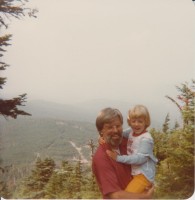 I know that not everyone shares my family’s fondness for poetry, but I do hope that over the next few days, you’ll take some time to read over these excerpts on your own, and let the wisdom and beauty of these poets’ words minister to you. However, whether you do or not, I’d feel remiss if, at a service for my father, we didn’t read at least one full poem aloud, so let’s take an extra minute or two now for the final poem mentioned in the program, by my father’s favorite poet, George Herbert:
I know that not everyone shares my family’s fondness for poetry, but I do hope that over the next few days, you’ll take some time to read over these excerpts on your own, and let the wisdom and beauty of these poets’ words minister to you. However, whether you do or not, I’d feel remiss if, at a service for my father, we didn’t read at least one full poem aloud, so let’s take an extra minute or two now for the final poem mentioned in the program, by my father’s favorite poet, George Herbert:
Death
By George Herbert
Death, thou wast once an uncouth hideous thing,
Nothing but bones,
The sad effect of sadder groans:
Thy mouth was open, but thou couldst not sing.
For we considered thee as at some six
Or ten years hence,
After the loss of life and sense,
Flesh being turned to dust, and bones to sticks.
We looked on this side of thee, shooting short;
Where we did find
The shells of fledge souls left behind,
Dry dust, which sheds no tears, but may extort.
But since our Savior’s death did put some blood
Into thy face,
Thou art grown fair and full of grace,
Much in request, much sought for as a good.
For we do now behold thee gay and glad,
As at Doomsday;
When souls shall wear their new array,
And all thy bones with beauty shall be clad.
Therefore we can go die as sleep, and trust
Half that we have
Unto an honest faithful grave;
Making our pillows either down, or dust.
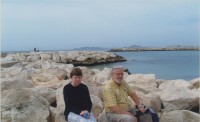 Herbert beautifully understands a point that C. S. Lewis makes in his novel The Screwtape Letters. The premise of this novel is that the character Screwtape is a senior demon with a long and successful history of tempting humans and keeping or leading them away from God, and now Screwtape is writing letters to his nephew, Wormwood, an inexperienced junior tempter who needs his assistance. Since the novel is set in wartime, young Wormwood is excited about the death and destruction, but Screwtape warns him that death is only to their demonic benefit if those who die are not Christians. He notes of humans that “They, of course, do tend to regard death as the prime evil and survival as the greatest good. But that is because we have taught them to do so. Do not let us be infected by our own propaganda.” As Herbert attests, death may indeed be the “prime evil” if we “look on this side of” it. And as Screwtape recognizes, death is also the “prime evil” for anyone who hopes to be saved by his own merits, or for any reason other than Christ’s sacrifice.
Herbert beautifully understands a point that C. S. Lewis makes in his novel The Screwtape Letters. The premise of this novel is that the character Screwtape is a senior demon with a long and successful history of tempting humans and keeping or leading them away from God, and now Screwtape is writing letters to his nephew, Wormwood, an inexperienced junior tempter who needs his assistance. Since the novel is set in wartime, young Wormwood is excited about the death and destruction, but Screwtape warns him that death is only to their demonic benefit if those who die are not Christians. He notes of humans that “They, of course, do tend to regard death as the prime evil and survival as the greatest good. But that is because we have taught them to do so. Do not let us be infected by our own propaganda.” As Herbert attests, death may indeed be the “prime evil” if we “look on this side of” it. And as Screwtape recognizes, death is also the “prime evil” for anyone who hopes to be saved by his own merits, or for any reason other than Christ’s sacrifice.
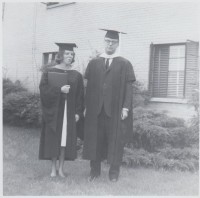 However, my father did not believe hell’s propaganda, did not think of death as the “prime evil.” He knew that, as a flawed human being, he would see heaven only by trusting in Christ’s blood, shed for our sins and validated by Christ’s resurrection. Yet because he did have this faith, he was not afraid to die; he saw death as “fair and full of grace … much sought for as a good.”
However, my father did not believe hell’s propaganda, did not think of death as the “prime evil.” He knew that, as a flawed human being, he would see heaven only by trusting in Christ’s blood, shed for our sins and validated by Christ’s resurrection. Yet because he did have this faith, he was not afraid to die; he saw death as “fair and full of grace … much sought for as a good.”
My father would have said his sins were many — and I think we could each say the same of ourselves, seeing our own hearts more clearly than even the people closest to us can. But most of what I saw in my father was worthy of praise, admiration, and emulation. I’ll close with these two examples my mother shared with me just the other day….
“Soon after I married your father,” she told me, “we were at a picnic for the children of our church, and someone got into a bee’s nest. I just grabbed the nearest kid and ran, and others were doing the same — but when I looked back, there was your father. He was standing over the nest, letting himself get stung multiple times, until everyone else could get a safe distance away. This showed me the character of the man I had married.”
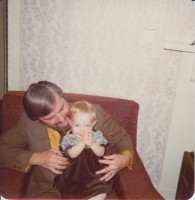 My mother then noted that even after forty-five years of marriage, his character had stayed much the same. “In recent months,” she said to me, “I’ve often had physical issues that required me to ask for his help, and if he was sleeping, I’d have to wake him up. Whenever I did, he’d always turn to me with a kind smile, as if to say, ‘I’m so glad to see you.'”
My mother then noted that even after forty-five years of marriage, his character had stayed much the same. “In recent months,” she said to me, “I’ve often had physical issues that required me to ask for his help, and if he was sleeping, I’d have to wake him up. Whenever I did, he’d always turn to me with a kind smile, as if to say, ‘I’m so glad to see you.'”
When my mother shared these examples with me, I cried, and am crying now as I type them up, and may cry again when I hear them read. My father often said, “The best gift a father can give his children is to love their mother.” I don’t think he was the origin of this insight, but he certainly lived it on a daily basis.
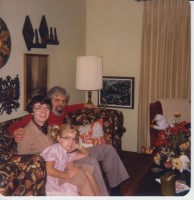 Out of respect for his and my aforementioned linguistic precision, I’m still not positive I could say he was the absolute best father in the world … however, it’s very hard for me to imagine a better one.
Out of respect for his and my aforementioned linguistic precision, I’m still not positive I could say he was the absolute best father in the world … however, it’s very hard for me to imagine a better one.
It’s lovely, Meredith, what you wrote . . . Just as your father was a lovely person.